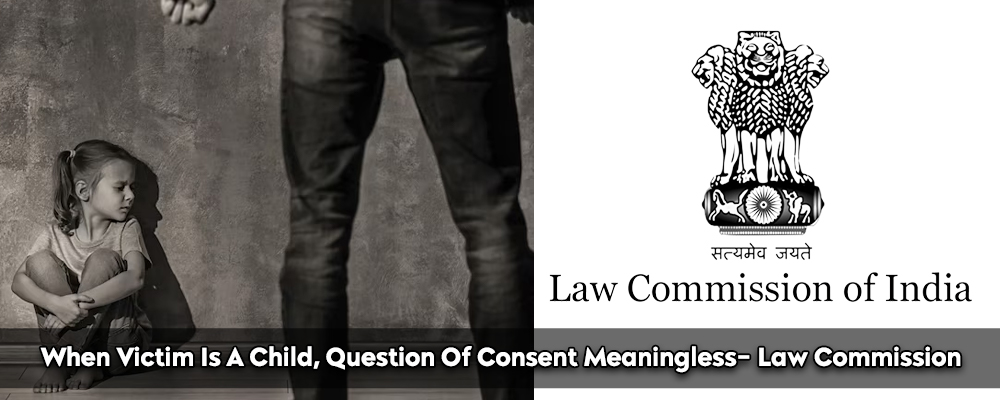In its 283rd report on ‘Age of Consent under the Protection of Children from Sexual Offences Act, 2012’, the Law Commission of India ruled out reducing the age of consent to 16 years under the POCSO Act. The Commission expressed that reducing the age of consent will not be advisable as it is of the view that a child is not capable of giving consent. The stand taken by the Commission is, based on the Supreme Court and the Parliamentary discussions which took place after the introduction of the POCSO Bill in 2011, it is clear that the law is strict in its application and the “consent” of a child can have no role to play whatsoever. When the victim is a child, the question of consent or any claim of there being any consent will be totally meaningless. As protecting the children from any sexual abuse or exploitation is the prime consideration, hence, reducing the age of consent will be detrimental to fulfilling the objective of the Act.
Need A Legal Advice
The internet is not a lawyer and neither are you. Talk to a real lawyer about your legal issue

283rd Report of the Commission
- After having consulted the National Commission for Protection of Child Rights (NCPCR), former judges, lawyers, child rights activists, NGOs and academicians who are experts in the fieldThe Law Commission has submitted its report.
- It is argued in the Report that reducing the age of consent will lead to a rise in child marriages and a further exploitation of the girl child. As per the report, the Prohibition of Child Marriage Act, 2006 (PCMA) is a weak law, which does not deal with the matter of sexual relations with a minor spouse, which was remedied through the POCSO Act to some extent.
- PCMA is also silent on age of consent and sexual relations with a minor, where the POCSO Act fills this void. When the Parliament is already considering to increase the age of marriage for girls to 21 years, as is with the boys, any decrease in the age of sexual consent will be against the tide of rational change.
- The Law Commission also acknowledged that the intent of the POCSO Act has never been to penalise romantic consensual relationships between minors. But, it cannot be the sole reason to risk exposing the children to exploitation by removing the protection provided under the Act.
- The report also provides that in the digital age, children under the age group of 16 to 18 years are more vulnerable when it comes to grooming and manipulation. Thus, any reduction in the age of consent would offer the paedophiles opportunity to exploit young children. The report cited constantly increasing instances of grooming, online child abuse and cyberbullying as another reason to not reduce the age of sexual consent.
- Socio-economic factors were also counted to oppose the change in the age of consent by the Commission in the Report. Lowering the age of consent and allowing the children to enter into romantic relationships would ultimately trap children in a vicious cycle of multi-dimensional and multi-generational poverty. The report stressed on a possible effect on the mental and physical growth of children facing exploitation, trafficking, prostitution etc.
- An emerging trend in Assam was also mentioned in the Report, where parents would arrange marriage between minors or a minor and an adult by having signed notarized agreements stating they have fallen in love and therefore, the families decided to marry them off. With these incidents, it was demonstrated that reducing the age of consent would inevitably provide an escape provision to force minor girls into subjugation, marital rape or any other forms of abuse, such as trafficking.
- The report emphasized that children, lack maturity, both physically and mentally, to properly understand the meaning and consequences of consent in sexual acts. The commission also mention the studies by the Ministry of Women and Child Development and the Kailash Satyarthi Children’s Foundation, where it was mentioned that children aged 15-18 will be highly vulnerable to exploitation and abuse, often at the hands of friends and romantic partners
- For consensual sex where both the parties are under 18 years of age, proper application of the Juvenile Justice Act will help avoid severe consequences and prevent miscarriage of justice. But, when one of the parties is an adult, guided judicial discretion has to be exercised to address the question of consent depending on the facts and circumstances, the report says.
For issues related to legal provisions, in case you are facing any confusion or need assistance of any kind such as free legal advice online or wish to talk to a lawyer, you may contact us at Lead India, as we offer you a team of experienced advocates who have been successfully handling cases related to civil as well as criminal laws as well as completing various legal procedures.





 Talk to a Lawyer
Talk to a Lawyer